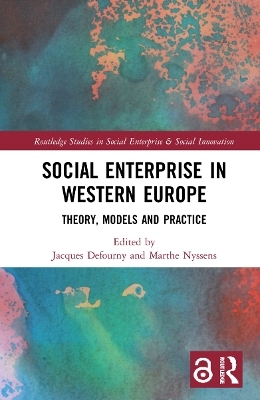
Social Enterprise in Western Europe
Routledge (Verlag)
978-0-367-15118-8 (ISBN)
In the last two decades, the quest for a widely accepted definition of social enterprise has been a central issue in a great number of publications.
The main objective of the ICSEM Project on which this book is based was to show that the social enterprise field would benefit much more from linking conceptualisation efforts to the huge diversity of social enterprises than from an additional and ambitious attempt at providing an encompassing definition. Starting from a hypothesis that could be termed "the impossibility of a unified definition", the ICSEM research strategy relied on bottom-up approaches to capture the social enterprise phenomenon in its local and national contexts. This strategy made it possible to take into account and give legitimacy to locally embedded approaches, while simultaneously allowing for the identification of major social enterprise models to delineate the field on common grounds at the international level.
Social Enterprise in Western Europe –the third volume in a series of four ICSEM-based books on social enterprise worldwide – will serve as a key reference and resource for teachers, researchers, students, experts, policy makers, journalists and others who want to acquire a broad understanding of the social enterprise and social entrepreneurship phenomena as they emerge and develop in this region.
Jacques Defourny is Professor Emeritus at the Centre for Social Economy, HEC Management School, University of Liege, Belgium. He was a founder and the first President of the EMES International Research Network. Marthe Nyssens is President of the EMES International Research Network and Professor and Pro-Rector "Society and Transition", UCLouvain, Belgium.
Part I: National Overviews of Social Enterprise. 1. Unity in Diversity: Exploring the Multiple Facets of the Belgian Social Enterprise Landscape Benjamin Huybrechts, Marthe Nyssens and Jacques Defourny. 2. Social Enterprise in Denmark: Historical, Contextual and Conceptual Aspects Linda Lundgaard Andersen, Lars Hulgård and Gurli Jakobsen. 3. A New Typology of Social Enterprise in Finland: Capturing the Diversity Harri Kostilainen, Eeva Houtbeckers and Pekka Pättiniemi. 4. Social Enterprise in France: At the Crossroads of the Social Economy, Solidarity Economy and Social Entrepreneurship? Francesca Petrella, Nadine Richez-Battesti, Laurent Fraisse, Jean-Louis Laville and Laurent Gardin. 5. Social Enterprise in Germany: Between Institutional Inertia, Innovation and Cooperation Nicole Göler von Ravensburg, Georg Mildenberger and Gorgi Krlev. 6. Social Enterprise in Iceland: The Long Journey Towards a Hybrid Welfare Model Steinunn Hrafnsdóttir and Ómar H. Kristmundsson. 7. Social Enterprise in Ireland: State Support Key to the Predominance of Work-Integration Social Enterprise (WISE) Patricia O’Hara and Mary O’Shaughnessy. 8. Social Enterprise in Italy: A Plurality of Business and Organisational Models Simone Poledrini and Carlo Borzaga. 9. Social Enterprise in the Netherlands: Between Hope and Hype Philip Marcel Karré. 10. Social Enterprises in Norway: Models and Institutional Trajectories Bernard Enjolras, Jill M. Loga, Lars U. Kobro and Hans A. Hauge. 11. Social Enterprise in Portugal: Concepts, Contexts and Models Sílvia Ferreira and Joana Almeida. 12. Social Enterprise in Spain: From a Diversity of Roots to a Tentative Typology of Models Millán Díaz-Foncea, Esther Villajos, Teresa Savall, Carmen Guzmán, Francisco Javier Santos, Marta Solórzano-García, Chaime Marcuello-Servós, Rafael Chaves-Ávila and Carmen Marcuello. 13. Social Enterprises in Sweden: Intertextual Consensus and Hidden Paradoxes Malin Gawell. 14. Social Enterprise Approaches in Switzerland Michaël Gonin, Nicolas Gachet and Philipp Erpf. 15. Social Enterprise in the UK: Models and Trajectories Mike Aiken, Roger Spear, Fergus Lyon, Simon Teasdale, Richard Hazenberg, Mike Bull and Anna Kopec Massey. Part II: Comparative Analyses and Perspectives. 16. Social Enterprises in France, Portugal and Spain: Between Path Dependence and Institutional Creation? Francesca Petrella, Nadine Richez-Battesti, Marta Solórzano-García and Sílvia Ferreira. 17. Social Enterprise in Belgium, Germany and the Netherlands: Where the Old Meets the New Philip Marcel Karré. 18. Between Coercive and Mimetic Institutional Isomorphism: Social Enterprise and the Universal Scandinavian Welfare State Bernard Enjolras, Linda Lundgaard Andersen, Malin Gawell and Jill M. Loga. 19. How Context Shapes the Character of Cooperative Social Enterprises: Insights from Various Countries Nicole Göler von Ravensburg, Richard Lang, Simone Poledrini and Marzena Starnawska. 20. Testing the Relevance of Major Social Enterprise Models in Western Europe Jacques Defourny, Marthe Nyssens and Olivier Brolis.
| Erscheinungsdatum | 24.02.2021 |
|---|---|
| Reihe/Serie | Routledge Studies in Social Enterprise & Social Innovation |
| Zusatzinfo | 31 Tables, black and white; 6 Line drawings, black and white; 6 Illustrations, black and white |
| Verlagsort | London |
| Sprache | englisch |
| Maße | 152 x 229 mm |
| Gewicht | 644 g |
| Themenwelt | Sozialwissenschaften ► Soziologie |
| Wirtschaft ► Betriebswirtschaft / Management ► Unternehmensführung / Management | |
| Wirtschaft ► Volkswirtschaftslehre | |
| ISBN-10 | 0-367-15118-9 / 0367151189 |
| ISBN-13 | 978-0-367-15118-8 / 9780367151188 |
| Zustand | Neuware |
| Haben Sie eine Frage zum Produkt? |
aus dem Bereich


